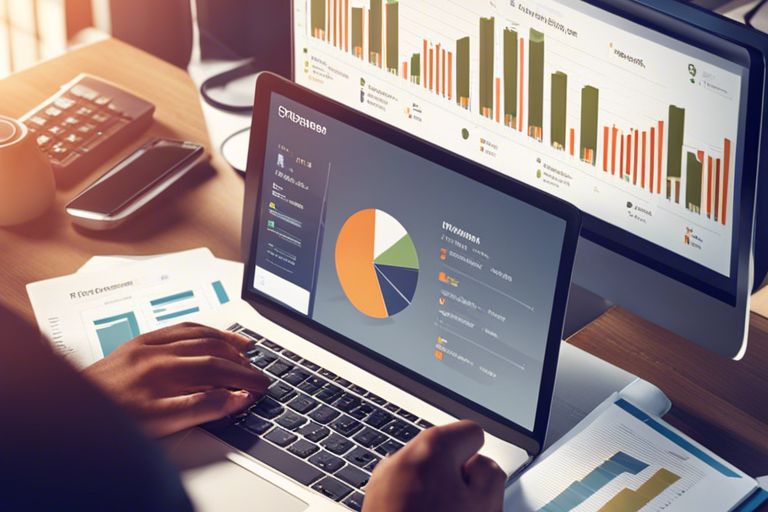As a freelancer or someone with a variable income, you understand the unique challenges that come with navigating the ups and downs of your financial landscape. While the freedom and flexibility of freelancing are undoubtedly appealing, the unpredictability of income can make budgeting feel like a daunting task. In this blog post, we will provide you with tailored budgeting advice to help bring stability to your finances and empower you to take control of your financial future.
Setting the Foundation
Assessing Your Financial Picture
Your first step in achieving financial stability as a freelancer is assessing your current financial situation. This involves understanding your income sources, expenses, and any fluctuation in earnings. Take a close look at your past income trends to identify patterns and anticipate potential challenges in the future. Calculate your average monthly income and expenses to get a clear picture of your financial health.
Creating a Base Budget for Stability
The key to navigating variable incomes is creating a base budget that covers your vital expenses during low-income months. Allocate a portion of your income towards fixed costs such as rent, utilities, groceries, and insurance. Aim to save a portion of your earnings for emergencies and irregular expenses. By establishing a base budget, you can ensure that you have a safety net in place to weather financial uncertainties.
The base budget should act as a foundation that provides stability in an unpredictable financial landscape. It serves as a roadmap to help you prioritize your expenses and maintain financial discipline. By setting aside a specific amount for vital expenses and savings, you can build a strong financial foundation that will support you during lean times.
Another important aspect of creating a base budget is being realistic about your income and expenses. Factor in potential fluctuations in your earnings and adjust your budget accordingly. Be proactive in monitoring your financial situation and make adjustments as needed to ensure that you stay on track towards your financial goals.
Building Your Freelancer’s Emergency Fund
Determining the Size of Your Emergency Fund
Now is the time to prioritize building an emergency fund as a freelancer. With variable incomes, having a safety net in place is crucial for financial stability. When determining the size of your emergency fund, it’s recommended to aim for at least three to six months’ worth of living expenses saved up. This can serve as a buffer during lean months or unexpected financial setbacks.
Strategies for Growing Your Safety Net
Building an emergency fund as a freelancer can be challenging, but there are strategies you can implement to grow your safety net. One approach is to set aside a portion of your income from each project or client payment. Automating this process through regular transfers to a high-yield savings account can help ensure consistent contributions to your emergency fund. Additionally, consider cutting back on non-important expenses and redirecting those savings towards your fund.
Freelancers with variable incomes should also explore alternative sources of income to supplement their freelance work. This could include taking on part-time gigs or creating passive income streams to bolster your financial security. By diversifying your income sources, you can better weather financial uncertainties and continue to build your emergency fund for long-term stability.
Income Management Techniques
Tracking and Projecting Freelance Income
Techniques for managing variable incomes revolve around tracking and projecting freelance earnings. Unlike traditional salary earners, freelancers must proactively monitor their income streams to ensure financial stability. By keeping meticulous records of past earnings and upcoming projects, freelancers can develop accurate projections for future cash flow.
Leveraging High-Income Months
Projecting high-income months is a crucial aspect of managing variable incomes. Techniques such as setting aside a portion of windfall earnings during lucrative periods can provide a safety net during lean months. By strategically leveraging high-income months, freelancers can create a buffer to navigate the unpredictable financial landscape that comes with freelance work.
The ability to forecast and capitalize on high-income months is a valuable skill for freelancers seeking financial stability. By implementing smart budgeting strategies during peak earning periods, freelancers can better manage budget fluctuations throughout the year, ultimately leading to greater financial security.

Expense Management and Reduction
Identifying and Cutting Non-Essential Spending
Reduction of unnecessary expenses is crucial for freelancers and individuals with variable incomes to achieve financial stability. Start by evaluating your spending habits and identifying non-imperative expenses that can be eliminated or reduced. Consider areas such as dining out, entertainment subscriptions, shopping for non-imperative items, or monthly subscriptions that are not being fully utilized. By cutting back on these expenses, you can allocate more funds towards your imperative needs and financial goals.
Seasonal Expenses and How to Prepare
An understanding of seasonal expenses is imperative for freelancers to maintain a steady budget throughout the year. By anticipating upcoming costs such as tax season, holiday spending, or fluctuations in work volume, you can prepare and set aside funds accordingly. An effective strategy is to create a separate savings account specifically designated for seasonal expenses. By setting aside a portion of your income each month, you can ensure that you are financially prepared for these fluctuating expenses.
This proactive approach to managing seasonal expenses not only provides financial stability but also reduces the stress and uncertainty that can come with variable incomes. By planning ahead and implementing these budgeting strategies, freelancers can navigate the unpredictable financial landscape with greater confidence and security.

Investing and Retirement Planning for Freelancers
Retirement Savings Options for the Self-Employed
One of the key challenges for freelancers is ensuring financial security in retirement, especially with variable incomes. Fortunately, there are retirement savings options specifically designed for the self-employed. One popular choice is a Simplified Employee Pension (SEP) IRA, which allows freelancers to contribute up to 25% of their net income, up to a certain limit, into a tax-deferred retirement account. This can provide a valuable opportunity to save for the future while reducing taxable income.
Making Investments with a Variable Income
Variable income can make traditional investing strategies challenging for freelancers. However, it is still possible to make smart investment decisions by focusing on diversification and long-term goals. One approach is to prioritize building an emergency fund to cover expenses during lean periods, and then gradually move towards investing in a mix of assets such as stocks, bonds, and real estate. This can help to spread risk and potentially increase returns over time.
This tailored approach to investing acknowledges the unique financial landscape faced by freelancers, providing stability and growth opportunities even with fluctuating incomes.
Taxes and Freelancing
For freelancers, understanding taxes is a critical aspect of managing your finances efficiently. Navigating the complexities of taxes can be daunting, but resources like Navigating Financial Uncertainty: A Guide for UX Freelancers can provide valuable insights into how to navigate this aspect of freelancing.
Navigating Quarterly Taxes
Quarterly taxes are a reality for freelancers, given their irregular income streams. It’s necessary to set aside a portion of your earnings each quarter to meet your tax obligations. Failure to do so can result in penalties and added stress at tax time. Keep track of your income throughout the year and make estimated tax payments to the IRS to avoid any unpleasant surprises.
Deductions and Credits for Freelancers
For freelancers, deductions and credits can have a significant impact on your tax liability. Understanding what expenses you can deduct and which credits you may be eligible for can help maximize your tax savings. Common deductions for freelancers include home office expenses, professional development costs, and healthcare premiums. Taking advantage of these deductions can result in substantial savings on your tax bill. However, it’s crucial to keep thorough records and work with a tax professional to ensure you are maximizing your deductions while remaining compliant with the tax laws.
Another important aspect to consider when it comes to deductions and credits is to stay informed about any changes to the tax laws that may affect freelancers. Being proactive in understanding how these changes impact your tax situation can help you plan accordingly and take advantage of any new opportunities for tax savings.

Tools and Resources
Once again, freelancers and those with variable incomes need to be equipped with the right tools and resources to navigate their financial landscape effectively. To research deeper into this topic, check out the Freelancer Guide: Financial Challenges & Solutions for invaluable insights.
Budgeting Apps and Software for Freelancers
Budgeting is crucial for freelancers to manage their variable incomes effectively. Utilizing budgeting apps and software tailored for freelancers can provide a clearer picture of cash flow, expenses, and potential savings. These tools can help freelancers set financial goals, track spending, and plan for fluctuations in income with ease.
Where to Find Professional Financial Advice
Software designed specifically for freelancers can provide personalized financial advice tailored to their unique needs. Whether it’s setting up a robust budgeting strategy, planning for taxes, or improving financial habits, seeking professional advice from financial experts can offer invaluable guidance for freelancers looking to establish stability in an unpredictable financial landscape.
Final Words
Now that you have equipped yourself with tailored budgeting advice for freelancers and individuals with variable incomes, you are better prepared to navigate the unpredictable financial landscape ahead. By implementing the tips and strategies outlined in this guide, you can bring stability and peace of mind to your financial situation. Remember to track your income and expenses diligently, prioritize building an emergency fund, and adopt a flexible budgeting approach that can adapt to fluctuations in your earnings.
Through careful planning and disciplined financial management, freelancers can take control of their finances and confidently face the challenges of a variable income. By staying proactive and mindful of your spending habits, you can ensure that your financial future remains secure and thriving. Embrace the opportunities that come with freelancing, harness your creativity and passion, and let your budgeting skills serve as a tool for financial empowerment and success.
Frequently Asked Questions
Q: Why is budgeting important for freelancers with variable incomes?
A: Budgeting is crucial for freelancers with variable incomes as it helps them manage their cash flow effectively, plan for fluctuations in earnings, and maintain financial stability in an unpredictable financial landscape.
Q: What are some key tips for budgeting as a freelancer with variable income?
A: Some key tips for budgeting as a freelancer with variable income include tracking your expenses diligently, setting aside a portion of your income for taxes and emergencies, creating a budget based on your average monthly income, and diversifying your income streams.
Q: How can freelancers create a budget that suits their variable income?
A: Freelancers can create a budget that suits their variable income by using a zero-based budgeting approach, prioritizing important expenses, setting realistic financial goals, and being flexible to adjust their budget as their income fluctuates.
Q: What are some common pitfalls to avoid when budgeting with variable incomes?
A: Some common pitfalls to avoid when budgeting with variable incomes include underestimating expenses, not saving for slow periods, failing to account for irregular income, and overspending during high-earning months.
Q: How can freelancers ensure financial stability in an unpredictable financial landscape?
A: Freelancers can ensure financial stability in an unpredictable financial landscape by building an emergency fund, diversifying their client base, investing in their skills and education, staying disciplined with their budget, and seeking professional financial advice when needed.




